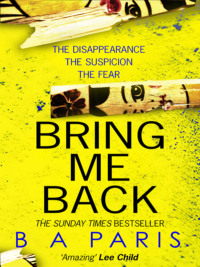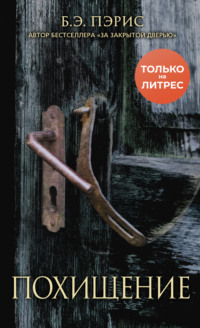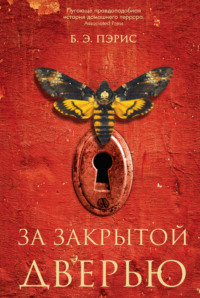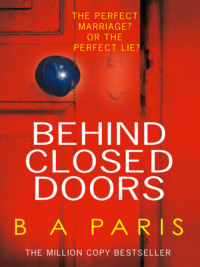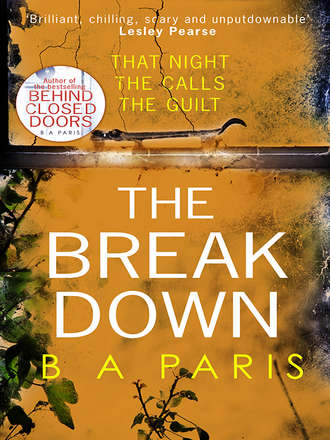
Полная версия
The Breakdown: The gripping thriller from the bestselling author of Behind Closed Doors
‘Yes, we bought Susie some luggage.’
‘Are you all right? You seem a bit down.’
Suddenly, the need to be on my own is overwhelming. ‘I’ve got a bit of a headache,’ I say, pulling away from him. ‘I think I’ll get an aspirin.’
I go upstairs, get a couple of aspirins from the bathroom and swallow them down with water from the tap. As I lift my head I catch sight of my face in the mirror and search it anxiously, looking for something that could give me away; something which would tell people that everything isn’t as it should be. But there’s nothing to show I’m any different to the person I was when I married Matthew a year ago, just the same chestnut hair and the same blue eyes staring back at me.
I turn my back on my reflection and go into the bedroom. My pile of clothes has been moved from the chair to the now-made bed, a gentle hint from Matthew to tidy them away. On a normal day I would be amused but today I feel irritated. My eyes fall on my great-grandmother’s writing desk and I remember the money Rachel spoke about, the hundred and sixty pounds that everybody gave me for Susie’s gift. If I took the money, it would be in there, it’s where I always put things I want to keep safe. Taking a deep breath, I unlock the little drawer on the left-hand side of the writing desk and pull it out. Lying inside is a scruffy pile of notes. I count them; there’s a hundred and sixty pounds exactly.
In the warm peace of my bedroom the hard facts of what I forgot suddenly loom over me. To forget a name or a face is normal but to forget suggesting a gift and taking money for it isn’t.
‘Did you take some aspirin?’ Matthew says from the doorway, making me jump.
‘I quickly push the drawer shut. ‘Yes, and I feel much better.’
‘Good.’ He smiles. ‘I’m going to have a sandwich. Do you want one? I thought I’d have mine with a beer.’
The thought of food still makes my stomach churn. ‘No, go ahead. I’ll get something later. I’ll just have a cup of tea.’
I follow him downstairs and sit down at the kitchen table. He puts a mug of tea in front of me and I watch him as he takes bread from the cupboard, a slab of cheddar from the fridge and makes himself a quick sandwich, pushing the two together and eating it without a plate.
‘That murder has been on the radio all morning,’ he says, crumbs dropping to the floor. ‘The road’s been closed and the police are all over it, looking for evidence. It’s insane to think it’s all happening five minutes from here!’
I try not to flinch and look absent-mindedly at the tiny white crumbs on our terracotta stone floor. They look as if they’re stranded at sea with no help in sight. ‘Do they know anything about her yet?’ I ask.
‘The police must do because they’ve advised her next of kin but they haven’t released any details. It’s awful to think what someone must be going through right now. Do you know what I can’t get out of my mind? That it could have been you if you’d been stupid enough to take that road last night.’
I stand, my mug in my hand. ‘I think I’ll go and lie down for a bit.’
He looks at me, concerned. ‘Are you sure you’re OK? You don’t look great. Perhaps we shouldn’t go to the party tonight?’
I smile sympathetically because he’s not a party person, he’d much rather have friends over for a casual dinner. ‘We have to, it’s Susie’s fortieth.’
‘Even if you still have a headache?’ I hear the ‘but’ in his voice and sigh.
‘Yes,’ I say firmly. ‘Don’t worry, you won’t have to talk to Rachel.’
‘I don’t mind talking to her, it’s just those disapproving looks she always gives me. She makes me feel as if I’ve done something wrong. Did you remember to get my jacket from the cleaner’s, by the way?’
My heart sinks. ‘No, sorry, I forgot.’
‘Oh. Well, never mind, I guess I can wear something else.’
‘Sorry,’ I say again, thinking of the present and all the other things I’ve forgotten lately. A few weeks ago, he had to come and rescue me and my trolley-load of food at the supermarket when I left my purse on the kitchen table. Since then, he’s found milk where the detergent should be and detergent in the fridge, and has had to deal with an angry call from my dentist over an appointment I forgot I’d made. So far he’s laughed it off, telling me I’m in overload because of the end of the school year. But like with Susie’s present, there have been other times when my memory has failed me, times he doesn’t know about. I’ve driven to school without my books, forgotten both a hair appointment and a lunch with Rachel, and last month I drove twenty-five miles to Castle Wells, unaware I’d left my bag at home. The thing is, although he knows that Mum died when she was fifty-five and that towards the end she was forgetful, I’ve never actually come out and told him that for the three years before she died, I had to wash, dress and feed her. Neither does he know that she was diagnosed with dementia when she was 44, just ten years older than I am now. Back then, I couldn’t believe he would still marry me if he thought there was a possibility that a dozen or so years down the line, I’d be diagnosed with the same thing.
I know now he would do anything for me but too much time has passed. How can I admit that I held things back from him? He’d been so open about not being able to have children and I’d repaid his honesty with dishonesty; I’d allowed my own selfish fears to get in the way of the truth. How I’m paying for that now, I think as I lie down on the bed.
I try to relax but images of last night flash through my mind, one after the other, like stills in a film. I see the car ahead of me on the road, I see myself swerving out around it, I see myself turning my head to look at the driver. And then I see the blur of a woman’s face, looking back at me through the window.
*
In the middle of the afternoon, Matthew comes to find me. ‘I think I’ll go to the gym for a couple of hours. Unless you want to go for a walk or something?’
‘No, it’s fine,’ I say, grateful to have some time on my own. ‘I need to sort through the stuff I brought back from school. If I don’t do it now, I never will.’
He nods. ‘Then we can both have a well-deserved glass of wine when I get back.’
‘Deal,’ I say, accepting his kiss. ‘Have fun.’
I hear the front door slam but, instead of going into the study to sort out my work things, I stay at the kitchen table and let my mind clamber over the thoughts in my head. The house phone rings – it’s Rachel.
‘You’ll never guess what?’ she says breathlessly. ‘You know that young woman who was murdered? Well, it turns out she worked in my company.’
‘Oh, God,’ I mutter.
‘I know, it’s awful, isn’t it? Susie’s in bits. She feels terrible and is cancelling the party – she just can’t bring herself to celebrate when the murder was of someone we knew.’
I feel a slight relief at not having to go out, but also slightly sick that the murdered woman is becoming ever more real.
‘Although I didn’t really know her because she worked in a different division to me…’ Rachel continues, before hesitating a moment. ‘Actually, I feel really bad because when I went into the office from the airport yesterday, I had an argument with someone over a parking space and I think it was her. I was quite verbal – it was the jet-lag talking – and now I wish I’d let it go.’
‘You weren’t to know,’ I say automatically.
‘Susie said the people who worked with her are devastated. Some of them know her husband and, apparently, he’s absolutely distraught – well, he would be, of course. And now he’s been left to bring up two-year-old twins by himself.’
‘Twins?’ The word echoes through my head.
‘Yes, twin girls. It’s such a tragedy.’
I go ice cold. ‘What was her name?’
‘Jane Walters, Susie said.’
The name hits me with the force of a sledgehammer. ‘What? Did you say Jane Walters?’
‘Yes.’
My mind spins. ‘No, it can’t be. It’s not possible.’
‘That’s what Susie said,’ Rachel insists.
‘But… but I had lunch with her.’ I’m so stunned I can hardly speak. ‘I had lunch with her and she was fine. It must be a mistake.’
‘You had lunch with her?’ Rachel sounds puzzled. ‘When? I mean, how did you know her?’
‘I met her at that leaving party you took me to, for that man who worked in your company – Colin. You know, the one you said it was all right for me to tag along to because there’d be so many people nobody would notice that I didn’t work for Finchlakers. I got talking to her at the bar and we swapped phone numbers, and then a few days later, she called me. I told you when you phoned from New York: I said I was going to lunch with her the next day – at least I thought I did.’
‘No, I don’t think so,’ Rachel says gently, understanding how distressed I am. ‘And even if you did, even if you’d told me her name, I wouldn’t have known who she was. I’m so sorry, Cass, you must feel dreadful.’
‘I was meant to be going round to hers next week,’ I say, realising. ‘To meet her little daughters.’ Tears spring to my eyes.
‘It’s horrible, isn’t it? And awful to think of her killer being out there somewhere. I don’t want to worry you, Cass, but your house must only be a couple of miles from where she was killed and, well, it is a bit isolated, stuck down the end of the road by itself.’
‘Oh,’ I manage, feeling sick. Because in all the turmoil and worry, I hadn’t thought about the killer still being out there. And that we can only get a mobile signal if we’re upstairs, by a window.
‘You don’t have an alarm, do you?’
‘No.’
‘Then promise you’ll lock the door when you’re home by yourself ?’
‘Yes – yes, of course I will,’ I tell her, desperate to get away, to stop talking about the woman who was murdered.
‘Sorry, Rachel, I have to go,’ I add hurriedly. ‘Matthew’s calling me.’
I slam the phone down and burst into tears. I don’t want to believe what Rachel just told me, I don’t want to believe that the young woman who was murdered in her car was Jane, my new friend, who would, I felt, have become a great friend. We had met by chance, at the party I had gone to by chance, as if we’d been destined to meet. Still sobbing, as clear as if it’s happening before my eyes, I see her edging towards the bar at Bedales.
*
‘Excuse me, are you waiting to be served?’ she asked, smiling at me.
‘No, don’t worry, I’m waiting for my husband to pick me up.’ I moved aside a little to make room for her. ‘You can squeeze in here, if you like.’
‘Thanks. It’s a good job I’m not desperate for a drink,’ she joked, referring to the number of people waiting to be served. ‘I didn’t realise Colin had invited so many people.’ She looked quizzically at me and I noticed how blue her eyes were. ‘I haven’t seen you around before. Are you new to Finchlakers?’
‘I don’t actually work for Finchlakers,’ I admitted guiltily. ‘I came with a friend. I know it’s a private function but she said there’d be so many people, nobody would notice if there was an extra person. My husband’s watching the match with friends tonight and she felt sorry for me being on my own.’
‘She sounds like a good friend.’
‘Yes, Rachel’s great.’
‘Rachel Baretto?’
‘Do you know her?’
‘No, not really.’ She smiled brightly at me. ‘My husband’s watching the match tonight too. And babysitting our two-year-old twins.’
‘How lovely to have twins! What are their names?’
‘Charlotte and Louise, better known as Lottie and Loulou.’ She took her mobile from her pocket and thumbed through photos. ‘Alex – my husband – keeps telling me not to do this, at least not to total strangers, but I can’t help it.’ She held the phone for me to see. ‘Here they are.’
‘They’re beautiful,’ I told her truthfully. ‘They look like two little angels in those white dresses. Which is which?’
‘This one is Lottie and that’s Loulou.’
‘Are they identical? They seem it to me.’
‘Not exactly but it’s quite difficult for most people to tell them apart.’
‘I bet.’ I saw the barman waiting to take her order. ‘Oh, I think it’s your turn.’
‘Oh, good. A glass of South African red, please.’ She turned to me. ‘Can I get you something?’
‘Matthew will be here soon but…’ I hesitated a moment ‘… I’m not driving, so why not? Thank you. I’ll have a glass of dry white.’
‘My name’s Jane, by the way.’
‘I’m Cass. But please don’t feel you have to stay here now that you’ve been served. Your friends are probably waiting for you.’
‘I don’t think they’ll miss me for a few more minutes.’ She raised her glass. ‘Here’s to chance meetings. It’s such a treat to be able to drink tonight. I haven’t been out much since the twins were born and when I do, I don’t drink because I have to drive home. But a friend is dropping me home tonight.’
‘Where do you live?’
‘Heston, on the other side of Browbury. Do you know it?’
‘I’ve been to the pub there a couple of times. There’s that lovely little park just across the road from it.’
‘With a wonderful play area for children,’ she agreed, smiling, ‘where I seem to spend quite a lot of my time now. Do you live in Castle Wells?’
‘No, I live in a little hamlet this side of Browbury. Nook’s Corner.’
‘I drive through it sometimes on my way back from Castle Wells, if I take that short cut that goes through the woods. You’re lucky to live there, it’s beautiful.’
‘It is, but our house is a bit more isolated than I’d like. It’s great to be only a few minutes from the motorway though. I teach at the high school in Castle Wells.’
She smiled. ‘You must know John Logan then.’
‘John?’ I laughed in surprise. ‘Yes, I do. Is he a friend of yours?’
‘I used to play tennis with him until a few months ago. Is he still telling jokes?’
‘Never stops.’ My phone, which I’d been holding in my hand, buzzed suddenly, telling me I had a text message. ‘Matthew,’ I told Jane, reading it. ‘The car park’s full so he’s double-parked in the road.’
‘You’d better go then,’ she said.
I quickly finished my wine, then said, truthfully, ‘Well, it was lovely talking to you, and thank you for the wine.’
‘You’re welcome.’ She paused, then went on, her words coming out in a rush. ‘I don’t suppose you’d like to have a coffee, or lunch even, some time, would you?’
‘I’d love to!’ I said, genuinely touched. ‘Shall we swap numbers?’
So we took each other’s mobile number and I gave her my home one, too, explaining about the terrible network reception, and she promised to give me a call.
And less than a week later, she did, suggesting lunch the following Saturday, as her husband would be home to look after the twins. I remember being surprised, but pleased, that she’d phoned so soon, and had wondered if she perhaps needed someone to talk to.
We met in a restaurant in Browbury and, as we chatted easily together, it felt as if she was already an old friend. She told me how she had met Alex and I told her about Matthew, and how we were hoping to start a family soon. When I saw him standing outside the restaurant, because he’d arranged to meet me there, I couldn’t believe it was already three o’clock.
‘There’s Matthew,’ I said, nodding towards the window. ‘He must have got here early.’ I looked at my watch and laughed in surprise. ‘No, he’s bang on time. Have we really been here two hours?’
‘We must have been.’ She sounded distracted and when I raised my head I saw that she was staring at Matthew through the window and I couldn’t help feeling a little burst of pride. He’d been told on more than one occasion that he looked like a young Robert Redford and people, especially women, often gave him a second look when they passed him in the street.
‘Shall I go and get him?’ I asked, standing up. ‘I’d like him to meet you.’
‘No, don’t worry, he looks busy.’ I glanced at Matthew; he had his phone out and was tapping away at it, engrossed in writing a text. ‘Some other time. I need to phone Alex, anyway.’
So, I left and, as I walked off hand in hand with Matthew, I turned and waved at Jane through the restaurant window.
*
The memory fades but my tears increase and somewhere inside me I’m aware that I hadn’t shed as many tears when Mum died, because I’d been expecting it. But this news about Jane has shocked me to the core, shocked me so much that it’s a while before everything comes together in my brain and I’m hit by the terrible realisation that it was Jane I saw in the car last night, Jane who had looked back at me through the window as I’d driven past, Jane who I’d left there to be murdered. The horror I feel is matched only by the guilt that presses down on me, suffocating me. I try to calm down, telling myself that if it hadn’t been raining so hard, if I’d been able to make out her features, if I’d known it was her, I would have got out of my car and run back to her through the rain without a second’s hesitation. But what if she had recognised me and was waiting for me to go and help her? The thought is horrendous, but if she had, surely she would have flashed her lights, or got out of her car and come to me? Then another thought hits me, more horrendous than the last: what if the killer had already been there, and she had let me drive away because she wanted to protect me?
*
‘What’s the matter, Cass?’ Matthew asks when he arrives back from the gym and finds me white-faced.
The tears that I can’t manage to still, spill from my eyes. ‘You know that young woman who was murdered? It was Jane.’
‘Jane?’
‘Yes, the girl I met a couple of weeks ago for lunch in Browbury, the one that I met at the party Rachel took me to.’
‘What?’ Matthew looks shocked. ‘Are you sure?’
‘Yes, Rachel phoned to tell me it was someone who worked for her company. I asked what her name was and she said Jane Walters. Susie’s cancelling her party because she knew her too.’
‘I’m so sorry, Cass,’ he says, putting his arms around me and holding me tight. ‘I can’t imagine how you must be feeling.’
‘I just can’t believe it’s her. It doesn’t seem possible. Maybe there’s been a mistake, maybe it’s another Jane Walters.’
I sense him hesitate. ‘They’ve released a picture of her,’ he says. ‘I saw it on my phone. I don’t know if…’ His voice trails off.
I shake my head because I don’t want to look, I don’t want to have to face the truth if it is Jane in the photo. But at least I would know.
‘Show me,’ I say, my voice trembling.
Matthew moves his arms from around me and we go upstairs so he can get on the Internet on his phone. While he searches for the latest news update, I close my eyes and pray: Please, God, please, God, don’t let it be Jane.
‘Here.’ Matthew’s voice is low. My heart thumps with dread but I open my eyes and find myself looking at a photo of the murdered woman. Her blonde hair is shorter than when we met for lunch and her eyes seem less blue. But it is definitely Jane.
‘It’s her,’ I whisper. ‘It’s her. Who would do such a thing? Who would do such a terrible thing?’
‘A madman,’ Matthew says grimly.
I turn and bury my face in his chest, trying not to cry again because he’ll wonder why I’m so upset when in his eyes I barely knew Jane.
‘He’s still out there somewhere,’ I say, suddenly scared. ‘We need an alarm.’
‘Why don’t you phone a couple of firms tomorrow and get them to come round and give us a quote? But don’t commit to anything before we’ve gone through everything with a fine-tooth comb. You know what these people are like – they’ll get you to sign up for things you don’t even need.’
‘All right,’ I say. But for the rest of the afternoon and evening, I’m desolate. All I can think of is Jane, sitting in her car, waiting for me to rescue her. ‘I’m sorry, Jane,’ I whisper. ‘I’m so sorry.’
FRIDAY, JULY 24TH
Jane haunts me. It’s a week since her murder and I can’t imagine there ever being a day when she isn’t foremost in my mind. The guilt I feel hasn’t lessened with time. If anything, it has increased. It doesn’t help that her murder is still very much in the news, with non-stop speculation by the media as to why she chose to stop on such an isolated road in the middle of a storm. Tests show that nothing was wrong with her car but because it was a fairly old model with wipers that barely functioned, the theory put forward is that she was having trouble seeing through her windscreen and was waiting for the storm to pass before continuing her journey.
Gradually, a picture begins to emerge. Just before eleven she left a voicemail message on her husband’s mobile, saying she was leaving one of the bars in Castle Wells, where she’d been at a friend’s hen night, and would be home soon. According to the staff at the restaurant, Jane had left the restaurant with her friends but had returned five minutes later to use the phone there because she’d realised she’d left her mobile at home. Her husband had fallen asleep on the sofa and hadn’t heard the call come in, so he had no idea that she hadn’t turned up until the police knocked on his door and told him the terrible news. Three people have come forward to say that although they drove down Blackwater Lane on Friday night, none of them saw her car, parked or otherwise. This allows the police to narrow the time of the murder down to somewhere between eleven-twenty – as it would have taken her around fifteen minutes to reach the lay-by from Castle Wells – and five to one, when the passing motorist found her.
There’s a voice in my head urging me to contact the police, to tell them she was still alive when I passed her car at around eleven-thirty, but the other voice, the one telling me that they’ll be disgusted that I didn’t do anything to help her, is louder. And surely, narrowing the time down by such a small margin won’t make any real difference to the murder inquiry. At least, that’s what I tell myself.
In the afternoon, a man from Superior Security Systems arrives to give a quote for an alarm system. He immediately gets my back up by arriving twenty minutes early and asking if my husband is in.
‘No, he’s not,’ I tell him, trying not to get distracted by the flakes of dandruff on the shoulders of his dark suit. ‘But if you run through the sort of system you think this house needs to make it secure, I’m sure I’ll be able to understand. As long as you speak slowly.’
The sarcasm is lost on him. Without waiting to be invited in he comes into the hall. ‘Are you often in the house on your own?’ he asks.
‘No, not really.’ His question makes me uneasy. ‘My husband will be home soon, actually,’ I add.
‘Well, looking at your house from the outside, I’d say it’s a prime target for burglars, being stuck as it is at the end of the road. You need sensor alarms on your windows, on your doors, in the garage, in the garden.’ He looks around the hall. ‘On the stairs too – you don’t want anyone creeping up on you in the middle of the night, do you? I’ll just take a look over the house, shall I?’
Turning on his heels, he heads for the stairs, taking them two at a time. I follow him up and see him making a quick check of the window at the end of the landing. He disappears into our bedroom and I hover outside the door, uneasy about him being in there on his own. It suddenly occurs to me that I never asked him for proof of identity and I’m appalled that, in the light of Jane’s murder, I wasn’t more careful about letting him in. When I think about it, he hadn’t said he was from the alarm company, I had just assumed he was, even though he was early. He could be anybody.



